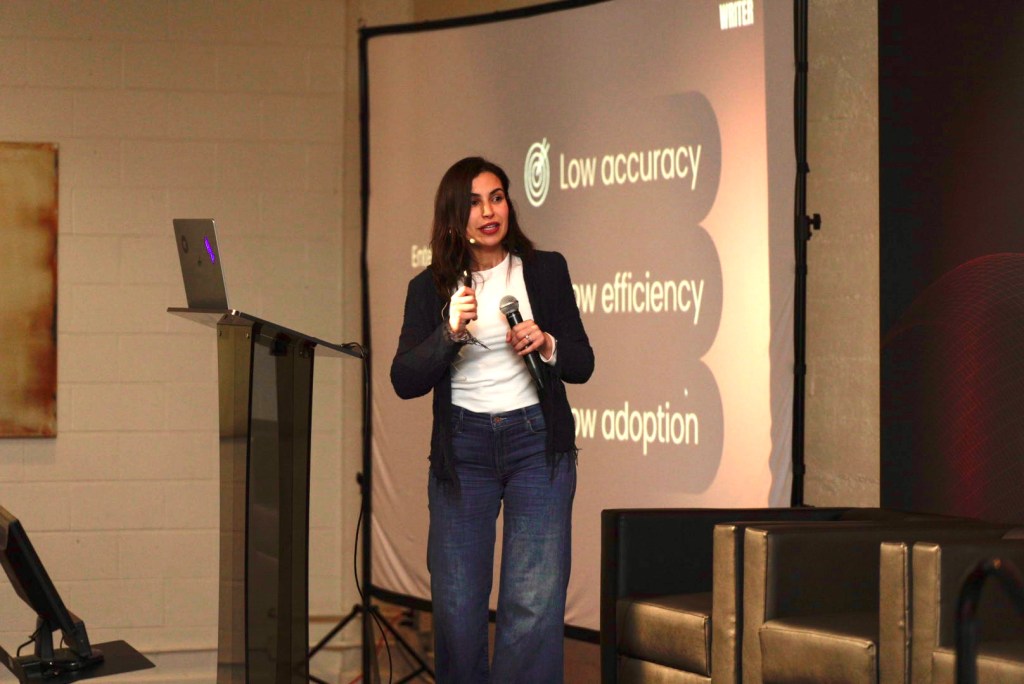
Following the announcement of Writer‘s newest features, CEO May Habib took to the stage at VB Transform to give context to the latest update and address the challenges facing enterprise generative AI adoption. The enterprise AI platform recently unveiled significant improvements to its artificial intelligence chat applications, including advanced graph-based retrieval-augmented generation (RAG) and new tools for AI transparency.
Writer’s upgrades, set to go live across its ecosystem tomorrow, mark a substantial leap in data processing capabilities. The revamped chat apps can now analyze up to 10 million words of company-specific information, a feature that will benefit both users of the “Ask Writer” application and developers using the AI Studio platform for custom solutions.
During her presentation, Habib offered a candid assessment of the current state of enterprise AI. “We talked to a lot of executive teams at Writer and those same AI execs were really excited to go talk to their boards 18 months ago about AI initiatives are now dreading those 15 minutes because there is not a ton of progress to show for it,” she revealed. Habib aims to address the gap between AI’s promise and its practical implementation in many businesses.
Habib highlighted three main obstacles impeding enterprise AI success: low accuracy, inefficiency and poor adoption rates. She shared a revealing statistic from a survey of 500 AI executives, where only 17% rated their AI applications as “good or better.” This data suggests that more than 80% of enterprise AI efforts aren’t meeting expectations.
Countdown to VB Transform 2024
Join enterprise leaders in San Francisco from July 9 to 11 for our flagship AI event. Connect with peers, explore the opportunities and challenges of Generative AI, and learn how to integrate AI applications into your industry. Register Now
To address these challenges, Writer has developed what Habib calls “full stack generative AI.” Central to this approach is the company’s graph-based RAG technology, which maps semantic relationships between data points for more targeted information retrieval. “Graph-based RAG on its own is amazing as an improvement over traditional RAG, but in the context of a composite AI system, it is truly fire,” Habib explained.
During the presentation, Habib demonstrated Writer’s new capabilities using a hospitality customer’s data set to craft personalized messages. She showed how the platform’s graph-based RAG system interprets complex queries breaks them down and provides clear reasoning for its outputs. Habib emphasized how Writer enables non-technical staff to work effectively with AI focusing on boosting accuracy efficiency and adoption in real business settings.
Another key feature in Writer’s update is the new “thought process” tool, which provides transparency into AI decision-making. Deanna Dong, product marketing lead at Writer, elaborated: “We’re showing you the steps it’s taking. We’re taking kind of like a maybe potentially a broad question or not super specific question which folks are asking, we’re actually breaking it down into the sub-questions that the AI is assuming you’re asking.”
Writer has also introduced specialized “modes” for different types of tasks, aiming to streamline the user experience and improve output quality. This feature addresses the difficulty many users face in properly prompting AI systems.
Habib’s presentation also touched on the broader implications of these innovations for enterprise AI adoption. She pointed out a surprising statistic about Microsoft’s Copilot: “If 50% of [employees] use it once a week to summarize an email, you’re in the top decile of Microsoft Copilot adoption.” This low adoption rate is another example of the need for more user-friendly AI tools in enterprise settings.
Author: Bryson Masse
Source: Venturebeat
Reviewed By: Editorial Team



